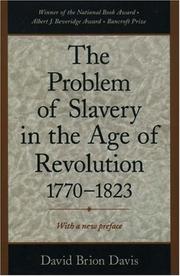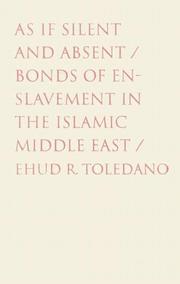| Listing 1 - 10 of 362 | << page >> |
Sort by
|
Book
ISBN: 1487517785 9781487517786 9781487503369 1487503369 1487517793 Year: 2018 Publisher: Toronto : University of Toronto Press,
Abstract | Keywords | Export | Availability | Bookmark
 Loading...
Loading...Choose an application
- Reference Manager
- EndNote
- RefWorks (Direct export to RefWorks)
The passions have long been condemned as the creator of disturbance and the purveyor of the temporary loss of reason, but, as Remo Bodei argues in Geometry of the Passions, we must abandon the perception that order and disorder are in a constant state of collision.
Emotions (Philosophy) --- Philosophy --- Descartes. --- French Jacobians. --- Hobbes. --- affirmation. --- individual and political projects. --- passion and reason. --- philosophy. --- self-enslavement.

ISBN: 0195128508 1280471883 0198029497 1602563403 9781602563407 9780198029496 9780195126716 0195126718 9781280471889 0195126718 0199880832 0197715583 9786610471881 6610471886 9780199880836 9780195128505 9780197715581 Year: 2023 Publisher: New York ; Oxford Universtiy Press,
Abstract | Keywords | Export | Availability | Bookmark
 Loading...
Loading...Choose an application
- Reference Manager
- EndNote
- RefWorks (Direct export to RefWorks)
Part of a trilogy "The Problem of Slavery in World History", this is the second book in the series. It features a preface exploring the anti-slavery debate among American historians, between the 1970s and 1990s, started by the original publication of this book in the 1970s.
Slavery. --- Slavery --- Abolition of slavery --- Antislavery --- Enslavement --- Mui tsai --- Ownership of slaves --- Servitude --- Slave keeping --- Slave system --- Slaveholding --- Thralldom --- Crimes against humanity --- Serfdom --- Slaveholders --- Slaves --- History. --- Enslaved persons

ISBN: 1281735388 9786611735388 0300137966 9780300137965 9781281735386 9780300114614 0300114613 9780300126181 0300126182 6611735380 Year: 2007 Publisher: New Haven Yale University Press
Abstract | Keywords | Export | Availability | Bookmark
 Loading...
Loading...Choose an application
- Reference Manager
- EndNote
- RefWorks (Direct export to RefWorks)
This groundbreaking book reconceptualizes slavery through the voices of enslaved persons themselves, voices that have remained silent in the narratives of conventional history. Focusing in particular on the Islamic Middle East from the late eighteenth to the early twentieth century, Ehud R. Toledano examines how bonded persons experienced enslavement in Ottoman societies. He draws on court records and a variety of other unexamined primary sources to uncover important new information about the Africans and Circassians who were forcibly removed from their own societies and transplanted to Middle East cultures that were alien to them. Toledano also considers the experiences of these enslaved people within the context of the global history of slavery.The book looks at the bonds of slavery from an original perspective, moving away from the traditional master/slave domination paradigm toward the point of view of the enslaved and their responses to their plight. With keen and original insights, Toledano suggests new ways of thinking about enslavement.
Slavery --- Abolition of slavery --- Antislavery --- Enslavement --- Mui tsai --- Ownership of slaves --- Servitude --- Slave keeping --- Slave system --- Slaveholding --- Thralldom --- Crimes against humanity --- Serfdom --- Slaveholders --- Slaves --- History. --- Enslaved persons
Book
ISBN: 1469602660 0807877670 9780807877678 9781469602660 9780807832189 0807832189 9780807871942 080787194X 9798893131772 Year: 2011 Publisher: Chapel Hill University of North Carolina Press
Abstract | Keywords | Export | Availability | Bookmark
 Loading...
Loading...Choose an application
- Reference Manager
- EndNote
- RefWorks (Direct export to RefWorks)
Putting the voices of the enslaved front and center, Gloria Garcia Rodriguez's study presents a compelling overview of African slavery in Cuba and its relationship to the plantation system that was the economic center of the New World. A major essay by Garcia, who has done decades of archival research on Cuban slavery, introduces the work, providing a history of the development, maintenance, and economy of the slave system in Cuba, which was abolished in 1886, later than in any country in the Americas except Brazil. The second part of the book features eighty previously unpublished primary doc
Slavery --- Abolition of slavery --- Antislavery --- Enslavement --- Mui tsai --- Ownership of slaves --- Servitude --- Slave keeping --- Slave system --- Slaveholding --- Thralldom --- Crimes against humanity --- Serfdom --- Slaveholders --- Slaves --- History --- Enslaved persons
Book
ISBN: 0804783756 9780804783750 9780804782333 0804782334 Year: 2012 Publisher: Palo Alto Stanford University Press
Abstract | Keywords | Export | Availability | Bookmark
 Loading...
Loading...Choose an application
- Reference Manager
- EndNote
- RefWorks (Direct export to RefWorks)
In the late nineteenth century, an active slave trade sustained social and economic networks across the Ottoman Empire and throughout Egypt, Sudan, the Caucasus, and Western Europe. Unlike the Atlantic trade, slavery in this region crossed and mixed racial and ethnic lines. Fair-skinned Circassian men and women were as vulnerable to enslavement in the Nile Valley as were teenagers from Sudan or Ethiopia.Tell This in My Memory opens up a new window in the study of slavery in the modern Middle East, taking up personal narratives of slaves and slave owners to shed light on the
Slavery --- Slaves --- Enslaved persons --- Persons --- Abolition of slavery --- Antislavery --- Enslavement --- Mui tsai --- Ownership of slaves --- Servitude --- Slave keeping --- Slave system --- Slaveholding --- Thralldom --- Crimes against humanity --- Serfdom --- Slaveholders --- History
Book
ISBN: 1443838098 9781443838092 1299658970 9781299658974 1443837369 9781443837361 Year: 2012 Publisher: Newcastle upon Tyne, UK Cambridge Scholars Publishing
Abstract | Keywords | Export | Availability | Bookmark
 Loading...
Loading...Choose an application
- Reference Manager
- EndNote
- RefWorks (Direct export to RefWorks)
Slaves have never been mere passive victims of slavery. Typically, they have responded with ingenuity to their violent separation from their native societies, using a variety of strategies to create new social networks and cultures. Religion has been a ma
Slavery --- Abolition of slavery --- Antislavery --- Enslavement --- Mui tsai --- Ownership of slaves --- Servitude --- Slave keeping --- Slave system --- Slaveholding --- Thralldom --- Crimes against humanity --- Serfdom --- Slaveholders --- Slaves --- Religious aspects. --- Enslaved persons
Book
ISBN: 082144574X 9780821445747 Year: 2007 Publisher: Athens, OH Ohio University Press
Abstract | Keywords | Export | Availability | Bookmark
 Loading...
Loading...Choose an application
- Reference Manager
- EndNote
- RefWorks (Direct export to RefWorks)
Examines slavery in the Great Lakes region and the complex role of Africans from the interior in the trade.Slavery was more important in the Great Lakes region than often has been assumed and Africans from the interior played a more complex role than was previously recognised.These ten 10 studies by the most prominent historiansof the region. They reveal the connections between the peoples of the region as well as their encounters with conquering Europeans.Slavery was not a uniform phenomenon and the line between enslaved and non-slave labour was fine.This book challenges the assertion that domestic slavery increased in Africa as the result of the international trade.HENRI MEDARD is a Lecturer in History at the University of Paris I Pantheon Sorbonne and Cemaj;SHANE DOYLE is a Lecturer in History at Leeds UniversityContributors include: DAVID SCHOENBRUN, JAN-GEORG DEUTSCH, MARK LEOPOLD, RICHARD REID, HOLLY HANSON, EDWARD I. STEINHART, JEAN-PIERRE CHRETIEN Uganda: Fountain Publishers; Kenya: EAEP
Slavery --- Abolition of slavery --- Antislavery --- Enslavement --- Mui tsai --- Ownership of slaves --- Servitude --- Slave keeping --- Slave system --- Slaveholding --- Thralldom --- Crimes against humanity --- Serfdom --- Slaveholders --- Enslaved persons --- History
Book
ISBN: 1474445128 1474401155 1474404936 9781474445122 9781474401159 9781474404938 9781474401142 1474401147 1474452167 Year: 2018 Publisher: Edinburgh : Edinburgh University Press,
Abstract | Keywords | Export | Availability | Bookmark
 Loading...
Loading...Choose an application
- Reference Manager
- EndNote
- RefWorks (Direct export to RefWorks)
Looking at scholarship on both 'old' and 'new' slavery, Laura Brace assesses the work of Aristotle, Locke, Hegel, Kant, Wollstonecraft and Mill, and explores the contemporary concerns of human trafficking and the prison industrial complex to consider the limitations of 'new slavery' discourse.
Slavery --- Abolition of slavery --- Antislavery --- Enslavement --- Mui tsai --- Ownership of slaves --- Servitude --- Slave keeping --- Slave system --- Slaveholding --- Thralldom --- Crimes against humanity --- Serfdom --- Slaveholders --- Slaves --- Political aspects. --- Enslaved persons
Book
ISBN: 9004346619 9789004346611 9789004346543 9004346546 Year: 2018 Publisher: Leiden Boston
Abstract | Keywords | Export | Availability | Bookmark
 Loading...
Loading...Choose an application
- Reference Manager
- EndNote
- RefWorks (Direct export to RefWorks)
The study of slavery has grown strongly in recent years, as scholars working in several disciplines have cultivated broader perspectives on enslavement in a wide variety of contexts and settings. Critical Readings on Global Slavery offers students and researchers a rich collection of previously published works by some of the most preeminent scholars in the field. With contributions covering various regions and time periods, this anthology encourages readers to view slave systems across time and space as both ubiquitous and interconnected, and introduces those who are interested in the study of human bondage to some of the most important and widely cited works in slavery studies.
Slavery. --- Abolition of slavery --- Antislavery --- Enslavement --- Mui tsai --- Ownership of slaves --- Servitude --- Slave keeping --- Slave system --- Slaveholding --- Thralldom --- Crimes against humanity --- Serfdom --- Slaveholders --- Slaves --- Enslaved persons
Book
ISBN: 9789766376857 9766376859 9766373892 9789766373894 Year: 2009 Publisher: Kingston ; Miami : Ian Randle Publishers,
Abstract | Keywords | Export | Availability | Bookmark
 Loading...
Loading...Choose an application
- Reference Manager
- EndNote
- RefWorks (Direct export to RefWorks)
Slavery --- Slaves --- Enslaved persons --- Persons --- Abolition of slavery --- Antislavery --- Enslavement --- Mui tsai --- Ownership of slaves --- Servitude --- Slave keeping --- Slave system --- Slaveholding --- Thralldom --- Crimes against humanity --- Serfdom --- Slaveholders --- Emancipation
| Listing 1 - 10 of 362 | << page >> |
Sort by
|

 Search
Search Feedback
Feedback About UniCat
About UniCat  Help
Help News
News